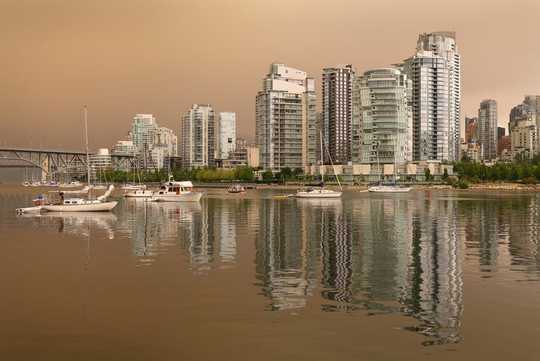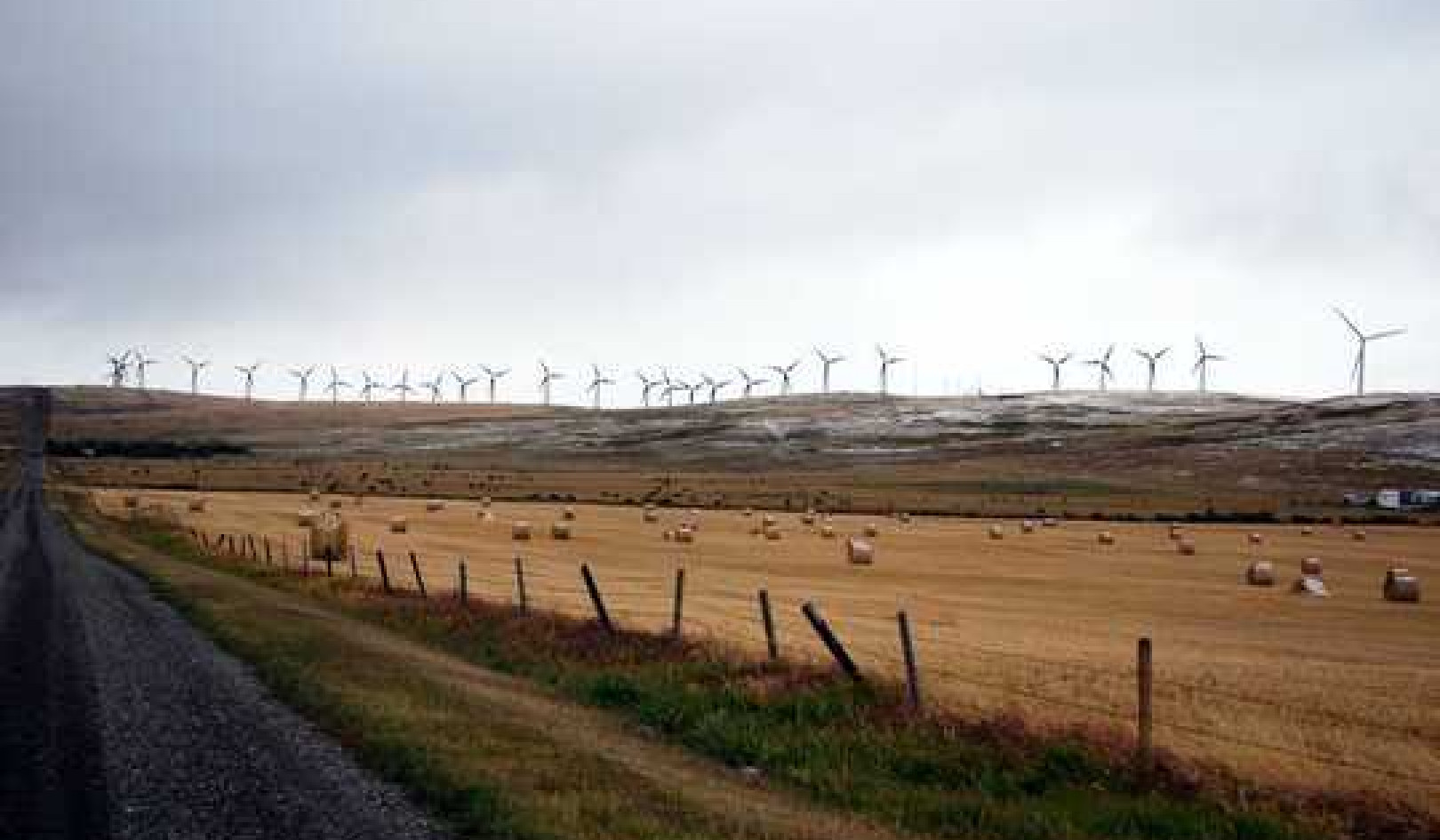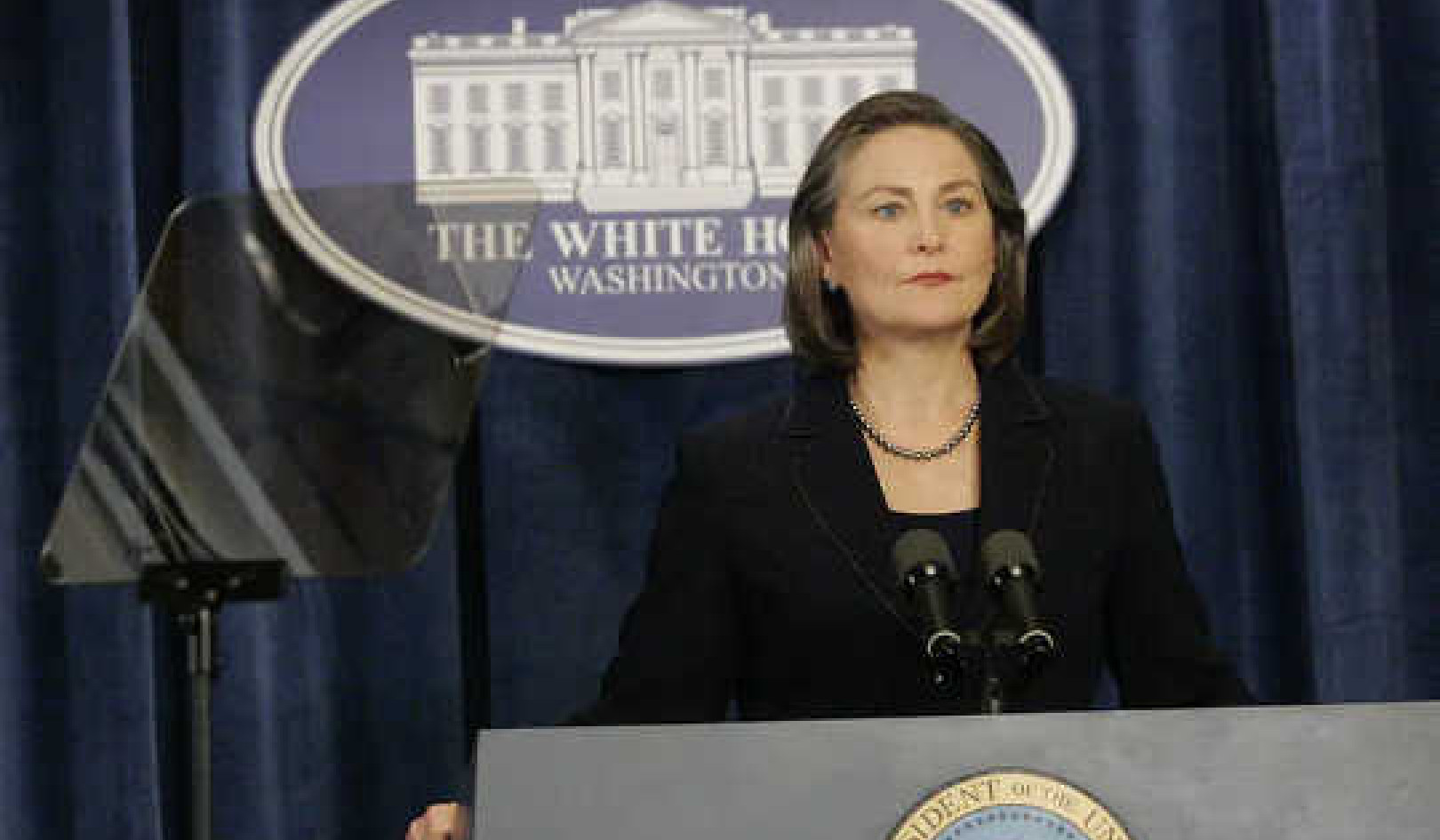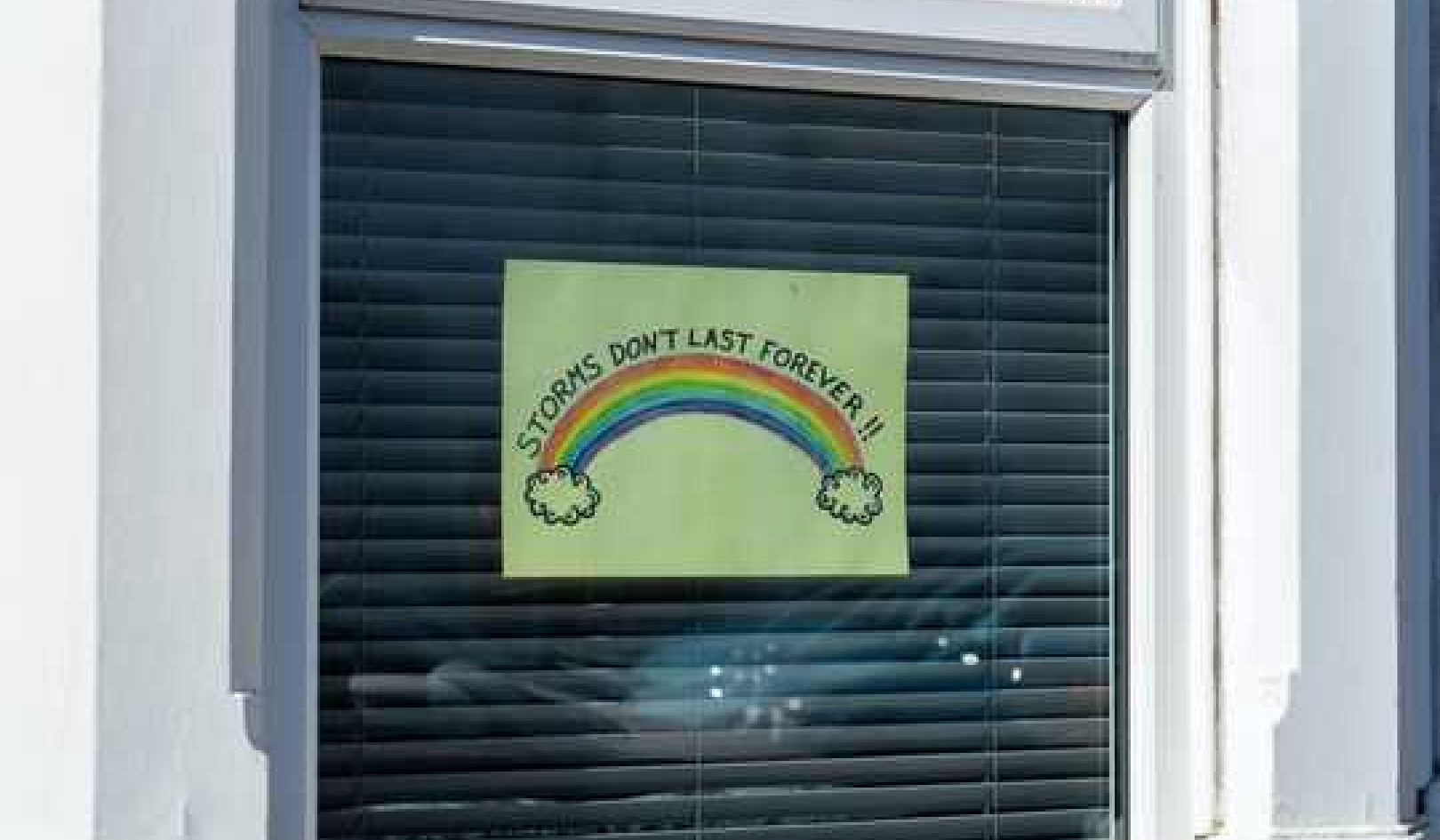 A smokey haze from wildfires burning in the region blankets Vancouver, B.C. Shutterstock
A smokey haze from wildfires burning in the region blankets Vancouver, B.C. Shutterstock
Doctors and economists may seem like strange partners. We spend our days working on very different problems in very different settings. But climate change has injected a common and urgent vocabulary into our work. We find ourselves agreeing both about the nature of the problem and the best solution. It’s essential that we put a price on carbon pollution.
For doctors across Canada, the evidence at the bedside is increasingly hard to ignore: climate change poses a serious health risk.
Emergency physician Edward Xie has worked in Toronto for over 10 years. Lately, he’s seen more patients anxious about tick bites. It’s no wonder. A recent medical study shows a fivefold increase in Lyme disease cases in Ontario between 2012 and 2017 as ticks expand their habitat northward.
Dr. Xie also notices more cases of heat exhaustion and dehydration in summer months — particularly among elderly and low-income individuals who lack adequate housing. In Toronto alone, heat already contributes to an estimated 120 deaths each year. The city expects that number to grow.
We’re paying for climate change with our health
The risks aren’t always obvious or intuitive.
In an interview, Dr. Sarah Chapelsky, an Edmonton internist, recalled patients who were hospitalized because they fled the Fort McMurray fires in May 2016 without taking their inhalers or prescriptions. Although it takes time to connect individual events to climate change, there is a growing body of evidence linking climate change and wildfires.
Fort McMurray’s hospital itself was evacuated, demonstrating the threat climate change poses not only to health, but to health systems.
 Burnt trees in Fort McMurray, Alta., in May 2016. THE CANADIAN PRESS/Jason Franson
Burnt trees in Fort McMurray, Alta., in May 2016. THE CANADIAN PRESS/Jason Franson
From Lyme disease and heat stroke to heightened risk of premature death, climate change puts the wellbeing of all Canadians at risk. The symptoms vary, but they share a root cause.
There’s more than our health at stake. Economists now view charged-up wildfires, floods and storms as a new normal — disruptive events that threaten homes, jobs, businesses and our continued prosperity.
The Fort McMurray wildfires cost Alberta $9 billion, about 2.5 per cent of provincial GDP. British Columbia’s 2018 wildfire season was its worst ever, breaking the record set in 2017. The asthma-aggravating smoke travelled hundreds of kilometres across the Prairies. Millions of Canadians inhaled poor-quality air for weeks.
Flooding, already Canada’s costliest extreme weather event, is getting worse. The recent floods in New Brunswick, Québec and Ontario established historically high watermarks.
A growing consensus
One way or another, we are paying the costs of climate change — in sick days and lost wages, rising health care costs and home insurance rates, and a less stable climate for the next generation. And we’re still adding new charges to our bill.
Both professions agree: we must act. Several Canadian medical organizations issued a call to all federal political parties to act on climate change, urging serious treatment for what the World Health Organization calls “greatest health threat in the 21st century.”
In a new open letter, more than 3,500 economists state that climate change is “a serious problem” calling for immediate action. The Lancet Countdown on Health and Climate Change research collaborative, which includes doctors and economists, agrees that adequately pricing carbon could be the single most important treatment for climate change.
Economics has a very clear prescription for these challenges: carbon pricing. In the same way that penicillin treats an infection, carbon pricing can help fight climate change. It effectively targets the root of the problem and there’s a mountain of evidence that it works.
Carbon pricing mobilizes market forces, creating incentives for businesses and individuals alike to seek out low-carbon alternatives. It encourages innovation, creating demand for non-polluting technologies and the industries that supply them. And it provides a clear signal to polluters that they are imposing costs on others.
Following doctor’s orders
There is good evidence that carbon pricing will slow climate change. It has reduced carbon emissions in British Columbia, several U.S. states, and across Europe for more than a decade. It was pivotal in the United Kingdom’s move away from coal power. A price on pollution was a vital part of the effort to eliminate acid rain in the 1990s. Like putting a price on tobacco, it encourages a gradual shift towards healthier behaviours.
While climate change harms vulnerable and low-income Canadians the most, carbon pricing in Canada is designed to immunize them from increased costs. By returning the revenues through household rebates, tax cuts and low-carbon investments like public transit, governments are using the revenues from carbon pricing to make the transition to a cleaner economy more affordable. When designed well, carbon pricing is a progressive policy. Canadian governments have designed their carbon pricing policies well.
Doctors and economists agree. Climate change is here, it’s getting worse, and the best time to do something about it is right now. For healthier families, a healthier economy, and a healthier planet, carbon pricing is just what the doctor (and the economist) ordered.![]()
About The Authors
Christopher Ragan, Director, Max Bell School of Public Policy, McGill University and Courtney Howard, Clinical associate professor, Department of Family Medicine, Cumming School of Medicine, University of Calgary
This article is republished from The Conversation under a Creative Commons license. Read the original article.
Related Books
Life After Carbon: The Next Global Transformation of Cities
by Peter Plastrik , John Cleveland The future of our cities is not what it used to be. The modern-city model that took hold globally in the twentieth century has outlived its usefulness. It cannot solve the problems it helped to create—especially global warming. Fortunately, a new model for urban development is emerging in cities to aggressively tackle the realities of climate change. It transforms the way cities design and use physical space, generate economic wealth, consume and dispose of resources, exploit and sustain the natural ecosystems, and prepare for the future. Available On Amazon
The future of our cities is not what it used to be. The modern-city model that took hold globally in the twentieth century has outlived its usefulness. It cannot solve the problems it helped to create—especially global warming. Fortunately, a new model for urban development is emerging in cities to aggressively tackle the realities of climate change. It transforms the way cities design and use physical space, generate economic wealth, consume and dispose of resources, exploit and sustain the natural ecosystems, and prepare for the future. Available On Amazon
The Sixth Extinction: An Unnatural History
by Elizabeth Kolbert Over the last half-billion years, there have been Five mass extinctions, when the diversity of life on earth suddenly and dramatically contracted. Scientists around the world are currently monitoring the sixth extinction, predicted to be the most devastating extinction event since the asteroid impact that wiped out the dinosaurs. This time around, the cataclysm is us. In prose that is at once frank, entertaining, and deeply informed, New Yorker writer Elizabeth Kolbert tells us why and how human beings have altered life on the planet in a way no species has before. Interweaving research in half a dozen disciplines, descriptions of the fascinating species that have already been lost, and the history of extinction as a concept, Kolbert provides a moving and comprehensive account of the disappearances occurring before our very eyes. She shows that the sixth extinction is likely to be mankind's most lasting legacy, compelling us to rethink the fundamental question of what it means to be human. Available On Amazon
Over the last half-billion years, there have been Five mass extinctions, when the diversity of life on earth suddenly and dramatically contracted. Scientists around the world are currently monitoring the sixth extinction, predicted to be the most devastating extinction event since the asteroid impact that wiped out the dinosaurs. This time around, the cataclysm is us. In prose that is at once frank, entertaining, and deeply informed, New Yorker writer Elizabeth Kolbert tells us why and how human beings have altered life on the planet in a way no species has before. Interweaving research in half a dozen disciplines, descriptions of the fascinating species that have already been lost, and the history of extinction as a concept, Kolbert provides a moving and comprehensive account of the disappearances occurring before our very eyes. She shows that the sixth extinction is likely to be mankind's most lasting legacy, compelling us to rethink the fundamental question of what it means to be human. Available On Amazon
Climate Wars: The Fight for Survival as the World Overheats
by Gwynne Dyer Waves of climate refugees. Dozens of failed states. All-out war. From one of the world’s great geopolitical analysts comes a terrifying glimpse of the strategic realities of the near future, when climate change drives the world’s powers towards the cut-throat politics of survival. Prescient and unflinching, Climate Wars will be one of the most important books of the coming years. Read it and find out what we’re heading for. Available On Amazon
Waves of climate refugees. Dozens of failed states. All-out war. From one of the world’s great geopolitical analysts comes a terrifying glimpse of the strategic realities of the near future, when climate change drives the world’s powers towards the cut-throat politics of survival. Prescient and unflinching, Climate Wars will be one of the most important books of the coming years. Read it and find out what we’re heading for. Available On Amazon
From The Publisher:
Purchases on Amazon go to defray the cost of bringing you InnerSelf.comelf.com, MightyNatural.com, and ClimateImpactNews.com at no cost and without advertisers that track your browsing habits. Even if you click on a link but don't buy these selected products, anything else you buy in that same visit on Amazon pays us a small commission. There is no additional cost to you, so please contribute to the effort. You can also use this link to use to Amazon at any time so you can help support our efforts.
























